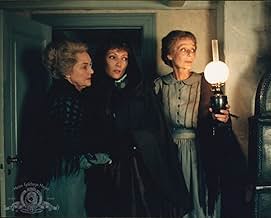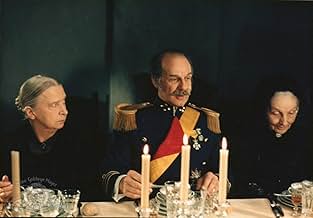IMDb रेटिंग
7.8/10
23 हज़ार
आपकी रेटिंग
अपनी भाषा में प्लॉट जोड़ेंDuring the late 19th century, a strict religious community in a Danish village takes in a French refugee from the Franco-Prussian War as a servant to the late pastor's daughters.During the late 19th century, a strict religious community in a Danish village takes in a French refugee from the Franco-Prussian War as a servant to the late pastor's daughters.During the late 19th century, a strict religious community in a Danish village takes in a French refugee from the Franco-Prussian War as a servant to the late pastor's daughters.
- 1 ऑस्कर जीते
- 11 जीत और कुल 8 नामांकन
Stéphane Audran
- Babette Hersant
- (as Stephane Audran)
Jean-Philippe Lafont
- Achille Papin
- (as Jean Philippe Lafont)
Ghita Nørby
- Narrator
- (वॉइस)
Asta Esper Hagen Andersen
- Anna
- (as Asta Esper Andersen)
फ़ीचर्ड समीक्षाएं
Flawlessly directed, written, performed, and filmed, this quiet and unpretentious Danish film is an example of cinema at its best, and if a person exists who can watch BABETTE'S FEAST without being touched at a very fundamental level, they are a person I do not care to know.
The story is quite simple. In the 1800s, two elderly maiden ladies (Birgitte Federspiel and Bodil Kjer) reside in remote Jutland, where they have sacrificed their lives, romantic possibilities, and personal happiness in order to continue their long-dead father's religious ministry to the small flock he served. One of the women's youthful admirers sends to them a Frenchwoman, Babette (Stéphane Audran), whose husband and son have been killed in France and who has fled her homeland lest she meet the same fate. Although they do not really require her services, the sisters engage her as maid and cook--and as the years pass her cleverness and tireless efforts on their behalf enables the aging congregation to remain together and the sisters to live in more comfort than they had imagined; indeed, the entire village admires and depends upon her.
One day, however, Babette receives a letter: she has won a lottery and is now, by village standards, a wealthy woman. Knowing that her new wealth will mean her return to France, the sisters grant her wish that she be allowed to prepare a truly French meal for them and the members of their tiny congregation. The meal and the evening it is served is indeed a night to remember--but not for reasons that might be expected, for Babette's feast proves to be food for both body and soul, and is ultimately her gift of love to the women who took her in and the villagers who have been so kind to her.
The film is extraordinary in every way, meticulous in detail yet not overpowering in its presentation of them. As the film progresses, we come to love the characters in both their simple devotion to God and their all-too-human frailties, and the scenes in which Babette prepares her feast and in which the meal is consumed are powerful, beautiful, and incredibly memorable. There have been several films that have used food as a metaphor for love, but none approach the simple artistry and beauty of BABETTE'S FEAST, which reminds us of all the good things about humanity and which proves food for both body and soul. Highly, highly recommended.
Gary F. Taylor, aka GFT, Amazon Reviewer
The story is quite simple. In the 1800s, two elderly maiden ladies (Birgitte Federspiel and Bodil Kjer) reside in remote Jutland, where they have sacrificed their lives, romantic possibilities, and personal happiness in order to continue their long-dead father's religious ministry to the small flock he served. One of the women's youthful admirers sends to them a Frenchwoman, Babette (Stéphane Audran), whose husband and son have been killed in France and who has fled her homeland lest she meet the same fate. Although they do not really require her services, the sisters engage her as maid and cook--and as the years pass her cleverness and tireless efforts on their behalf enables the aging congregation to remain together and the sisters to live in more comfort than they had imagined; indeed, the entire village admires and depends upon her.
One day, however, Babette receives a letter: she has won a lottery and is now, by village standards, a wealthy woman. Knowing that her new wealth will mean her return to France, the sisters grant her wish that she be allowed to prepare a truly French meal for them and the members of their tiny congregation. The meal and the evening it is served is indeed a night to remember--but not for reasons that might be expected, for Babette's feast proves to be food for both body and soul, and is ultimately her gift of love to the women who took her in and the villagers who have been so kind to her.
The film is extraordinary in every way, meticulous in detail yet not overpowering in its presentation of them. As the film progresses, we come to love the characters in both their simple devotion to God and their all-too-human frailties, and the scenes in which Babette prepares her feast and in which the meal is consumed are powerful, beautiful, and incredibly memorable. There have been several films that have used food as a metaphor for love, but none approach the simple artistry and beauty of BABETTE'S FEAST, which reminds us of all the good things about humanity and which proves food for both body and soul. Highly, highly recommended.
Gary F. Taylor, aka GFT, Amazon Reviewer
This movie came aside as a shock in the eighties.Far from trends,that is to say in the heart of sincere creativity,Babettes gaestebud stands as one of the finest movies of its time.Stephane Audran,the wonderful actress of her ex-husband Claude Chabrol's greatest achievements (le boucher,la rupture,les noces rouges,all unqualified musts for movie buffs)gave a lifetime performance.To see her prepare with love and affection her meal is a feast for the eyes.All the people who saw this masterpiece actually tasted,ate Babette's culinary triumph. But the most moving part of the story is its conclusion:Babette was a great French chef,she was famous,now she found a new homeland but her heyday is behind her and she won't never be allowed to come back to her dear France.So the two old sisters do comfort her:In heaven,there will be huge kitchens where she'll cook for eternity.While sharing her fortune with her new friends,Babette changed their life,she gave them pleasure and a magic evening they would remember forever.In this simple but extraordinary screenplay,human warmth is everywhere,and I wish everybody a Babette's feast,would it be only for one starry night...
This movie is almost unknown, but it is very good. In a lonely Danish town, two old sisters live remembering a far youths, when, due to a strict puritan education, they had to reject happiness. Lonely, then, the live in a dignified austerity, until Babette, who flies from Paris, frightened by the horror of the war, arrives. In few time, she will be able to turn the goodness and love she received when she arrived. A good lottery prize lets her organize a great banquet, following the best rules of French gastronomy. All neighbourhoods are invited (all fanatically puritans). They accept, but they pact to not show any trace of pleasure or enjoyment, as it would be a sin. However, the seductive force of the delicious meal they eat, that they become seduced by the sensuality of French gastronomy. The banquet end in a very felt, though quietly, happiness. The love between humans has awaken. The miracle of rise the human kindness due to the pleasure of the sense has begun. The movie is surprisingly good, but it is not for all tastes. During most of the movie, nothing happens, all is so quiet and so peaceful, that during many minutes, you can only see the life of the inhabitants of the town. But, as the movie develops, it becomes more precious, when Babette wins the lottery prize (after 30min movie), the show begins. The author is able, with a perfect directing, to show us how Babette prepares the banquet, how she mixes all the ingredients with the most wonderful one (Love), all told in a quiet delicious way, with a perfect knowledge of photography and acting. Then, as the banquet goes by, the quality in showing us how the mood of all eaters changes due to the meal, only with first shots, with impressively filmed scenes one after another is simply astonishing. In addition, the tact with the colours and the photography is also superb, almost every scene of the movie is like a picture, so work is involved there. If you are able to admire good cinema and are able to realize that sometimes the way on telling you something rather than what is told is more important, this is your movie. If you happen to like good meals and just love the good gastronomy, probably, you'll feel amused, as most feelings of the movie will be familiar to you. An Oscar totally deserved. The only problem is its slowness at setting up the story, but, I can forgive it (I hope everyone too)
This delicately told and moving story about the two devout daughters of a Danish Lutheran minister and their French servant is one of the finest European films of the 1980s. Set in a small, remote, austere Danish seaside town in the mid-19th century, the daughters devote their lives to continuing the work of their father in service of God, and in care for their needy townspeople. One of the daughters had turned down a promising opera career -- and the love of her French voice coach (a famous opera singer himself) -- to remain with her father and the town. Many years later the French singer sends a woman (Babette) -- who had lost her family in an outbreak of civil war -- to live with the sisters. She turns out to be an excellent cook, housekeeper and a shrewd shopper. The story culminates in a sumptuous feast prepared by Babette coinciding with a memorial to the reverend minister's 100th birthday. This delicious screenplay was adapted from the Isak Denisson (pen name for Karen Blixen) short story originally published in the Ladies Home Journal.
It has started quietly. If your are looking for an action-packed movie this is absolutely not the right choice. All characters are slowly depicted on the scene. Stroke after stroke on the scene canvas. None can take away his hands to the priest and so the sisters lifespan devotion can only remain into the village. Philippa and Martina know their destiny, belong only to the village. So when you understand that, you are on the movie scene, in the village that becomes the whole known world in that time. When, no technology can let you imagine anything else than the campaign, the village, the sea. You feel the rhythm of that ancient village's life. Watching the movie in a cold snowy late afternoon can cause you to approach this evening dinner with some sumptuous expectations ...
The final sentence that give a title to Babette's sacrifice far from Paris: An artist is never poor.
Superb photography. Many situations depict portraits and landscapes as they were styled on canvas there, in Jutland, in 18th century.
The final sentence that give a title to Babette's sacrifice far from Paris: An artist is never poor.
Superb photography. Many situations depict portraits and landscapes as they were styled on canvas there, in Jutland, in 18th century.
क्या आपको पता है
- ट्रिवियाFirst Danish movie to win an Academy Award for best foreign language film.
- गूफ़In 1871 Babette pays with skilling, which was the currency used at that time; 14 years later, Babette still uses skilling, but Denmark changed the currency in 1875 from skilling to kroner and orer.
- कनेक्शनEdited into Eventyret om dansk film 18: Nye perspektiver - 1970-1987 (1996)
- साउंडट्रैकWaltz No. 15 in A-flat major Op. 39
(arranged for orchestra) (uncredited)
Written by Johannes Brahms
Played during the dance hosted by the Royal family
टॉप पसंद
रेटिंग देने के लिए साइन-इन करें और वैयक्तिकृत सुझावों के लिए वॉचलिस्ट करें
- How long is Babette's Feast?Alexa द्वारा संचालित
- Who is the man sitting in the kitchen?
- What is the dinnerware used in Babette's Feast?
- What is the menu for the feast?
विवरण
बॉक्स ऑफ़िस
- US और कनाडा में सकल
- $43,98,938
- दुनिया भर में सकल
- $46,37,920
- चलने की अवधि1 घंटा 43 मिनट
- ध्वनि मिश्रण
- पक्ष अनुपात
- 1.66 : 1
इस पेज में योगदान दें
किसी बदलाव का सुझाव दें या अनुपलब्ध कॉन्टेंट जोड़ें
































